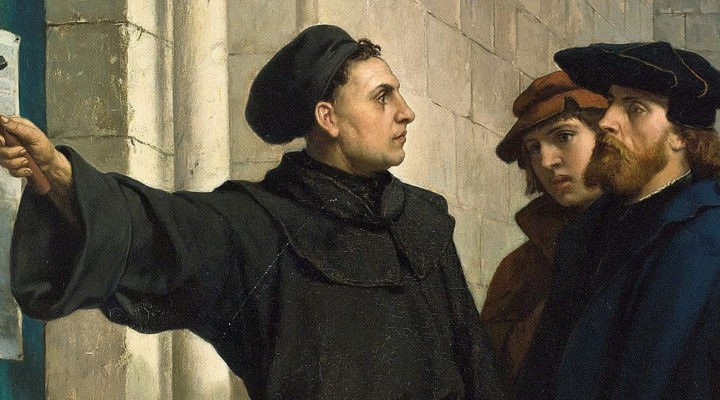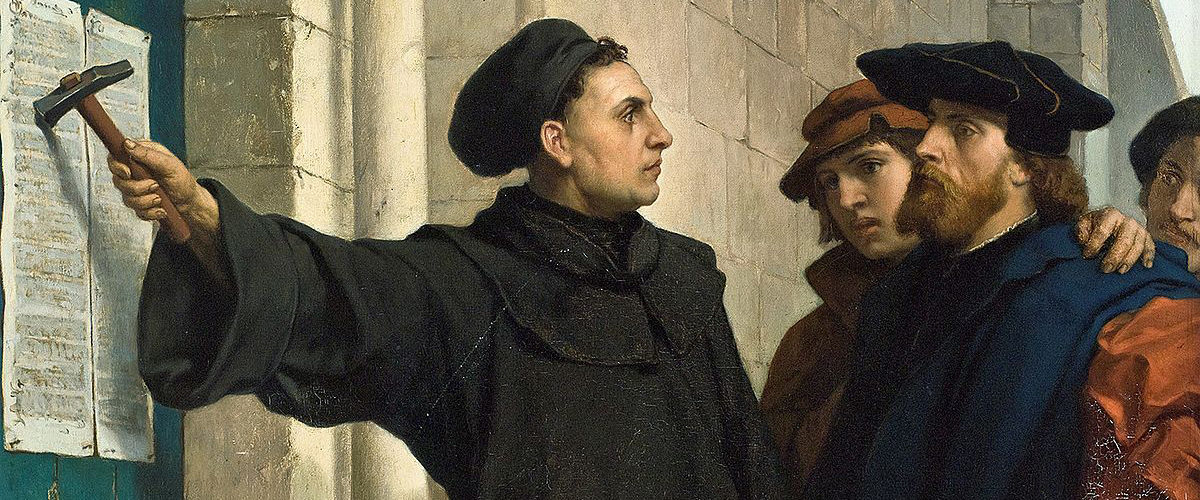In short, I will preach it, teach it, write it, but I will constrain no one by force, for faith must come freely without compulsion. Take myself as an example. I opposed indulgences … but never with force. I simply taught, preached and wrote God’s Word; otherwise I did nothing. And while I slept or drank Wittenberg beer with my friends Philipp and Amsdorf, the Word … did everything. — Martin Luther, 1483-1546
We Protestants know, or should know, that Oct. 31 carries a calendarized double duty —Halloween, of course, a decorations day second only to Christmas, as all the scary yard displays in our neighborhood ominously illustrate, and Reformation Day, as so many American Christians easily forget, if they ever knew of it at all.
On Oct. 31, 1517, Martin Luther, an Augustinian monk and professor of Scripture studies at the University of Wittenberg, Germany, posted his infamous “Ninety-Five Theses” on the lefthand side of the front doors of the Castle Church, the de facto bulletin board of the university.

Bill Leonard
The theses called for debates regarding the authority of the popes, especially their practice of selling indulgences, documents grounded in papal authority, claiming to remit time in purgatory after proper prayers were said and proper fees paid. Leo X, Luther’s pope, used such funds to complete St. Peter’s Cathedral in Rome, still the largest church in Christendom.
Luther’s localized call for theological disputes in an academic context exploded when the 95 assertions were translated into German and other languages and circulated through 16th century social media, the printing press. The uproar marks the beginnings of the Protestant Reformation, the roots of today’s varied denominations.
Across the centuries, the legacy of Oct. 31, 1517, led some Christians to declare Ecclesia Semper Reformanda, the church is always reforming. Having studied the history of the Christian church for 50 years, I’d amend that statement accordingly, Ecclesia Nonnunquam Reformanda, the church is sometimes reforming. At other times, often when it was most needed, the church defied reformation. Illustrations abound:
- Sixteenth century Protestants resisted reformation when Anabaptists (Swiss Brethren, Mennonites) challenged the link between infant baptism and citizenship. Ulrich Zwingli, the reformer of Zurich, acquiesced to the drowning of Anabaptist Felix Mantz in the Limmat River when he refused baptism for his infant child.
- Genevan reformer John Calvin acquiesced in the burning of Michael Servetus because he had the “wrong” theology of the Holy Trinity.
- During extended periods of their marriage, Quaker founders George Fox and his spouse, Margaret Fell Fox, were imprisoned through the recommendation of British church/state officials for proclaiming Quaker views.
- Nineteenth century Baptists, Methodists and Presbyterians in the American South used the Bible to undergird their acceptance of chattel slavery, forming new slavery-supporting denominations to protect those views.
- Twentieth century Baptists, Methodists and Presbyterians supported Jim Crow laws, segregation and white supremacy in the South.
Sometimes, in the church of Jesus Christ, reformation is a long time coming. That means today’s churches, like Jesus and Martin Luther, live somewhere between celebration and dissent.
“Today’s churches, like Jesus and Martin Luther, live somewhere between celebration and dissent.”
Jesus goes to Jerusalem to celebrate Passover, but as John Dominic Crossan says, he also “went to Jerusalem that one (or last) time because it was a capital city where religion and violence — conservative religion and imperial oppression — had become serenely complicit.”
Jesus’ reformation was a prophetic dissent against “Jewish religious cooperation with Roman imperial control … a permanently valid protest demonstration against any capital city’s collusion between conservative religion and imperial violence at any time and in any place.”
Jesus says, “You must not turn my Father’s house into a market.”
Luther’s reformation begins on the day before the celebration of All Saints Day with a challenge to the very foundations of the church of his day, papal supremacy and church/state alliances. His message was a prophetic assertion of truths he believed long obscured by the church of his day: “The just shall live by faith;” “We have no priest save Christ himself;” and “Faith must come freely without compulsion.”
But celebration turned into dissent. Jesus confronted the temple moneychangers; Luther confronted the indulgence-selling popes, hucksters peddling false promises by which sinners could purchase grace drawn on the storehouse of merit — good works generated by the saints that could be transferred to those who needed a little more to get themselves or their relatives out of purgatory. One of Luther’s theses declared, “The saints have no extra credits.” (Dear God, what a truth, then and now.)
In a Dissent in American Religion, Edwin S. Gaustad, writes, “Dissent cannot be understood simply in terms of whines against oppression, resistance to organizational corruption, demurrers against the affirmations of others.” Dissenters, Gaustad insists, are much more than “merely noisy nay-sayers.” Instead, “the dissenter is a powerful if unpredictable engine in the service of a cause.”
At their best, often at their messiest, dissenters are both prophetic witnesses to the insensitivities of church and culture and agents of celebration for the possibilities of reformation. Gaustad admits that “history hones dissent to a fine edge: sharp, severe and unyielding.”
“The moneychangers and indulgence sellers kept hawking their wares long after Jesus and Luther had their say.”
Dissent is concerned with fostering change, righting wrongs and correcting injustice. But that may not happen, at least not all at once. The moneychangers and indulgence sellers kept hawking their wares long after Jesus and Luther had their say.
In fact, dissent for justice’s sake doesn’t often provoke immediate change. It begins with witness, a dissenter consumed with a “zeal for God’s house,” the sunrise of God’s New Day in the world. Sometimes the most we can do is “give a witness” by our dissent and hope for reformation when future generations take up the cause for social and spiritual transformation.
On All Hallows’ Eve 2023, American churches need reformation for many reasons, none more than those individuals and communions that claim the appellation “evangelical,” not because of the intensity of their doctrines, but for their continued support of the national indulgence seller, Donald Trump. Evangelical affirmation of Trump, especially for a second presidential term, negates their orthodoxy, their biblicism and their claim to occupy the moral high ground in a sin-infested American culture. In fact, evangelicals’ support for Trump parallels the moral collapse present in Southern churches that supported slavery on the basis of the word of God, a permanent historical contradiction of their gospel witness.
“The Word did everything,” Martin Luther wrote, and the Reformation came upon them. Perhaps the Word will come upon evangelicals and the rest of us before it is too late, if we teach, preach and write it as we ought, with or without Wittenberg beer.
God help us. Here we stand. Amen.
Bill Leonard is founding dean and the James and Marilyn Dunn professor of Baptist studies and church history emeritus at Wake Forest University School of Divinity in Winston-Salem, N.C. He is the author or editor of 25 books. A native Texan, he lives in Winston-Salem with his wife, Candyce, and their daughter, Stephanie.


